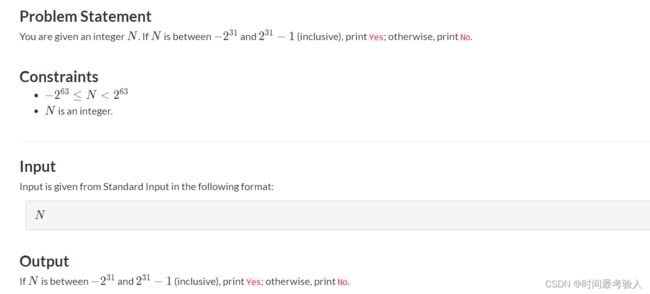AtCoder Beginner Contest 237题解(A-E)
AtCoder Beginner Contest 237题解
文章目录
- AtCoder Beginner Contest 237题解
-
- A - Not Overflow
- B - Matrix Transposition
- C - kasaka
- D - LR insertion
- E - Skiing
A - Not Overflow
【题目链接】A - Not Overflow (atcoder.jp)
题意:给一个数n,判断是否溢出!
两种解法:
- 计算
2^31 - 1和-2^31,判断是否在范围内 - int类型的范围是
-2^31 ~ 2^31-1,将LL型的n转为整型的m,如果两个数相等的话,说明没有溢出,反之溢出! - 【代码实现】
#include【方法二】
#includeB - Matrix Transposition
【题目链接】B - Matrix Transposition (atcoder.jp)
题意:求矩阵的转置。(将矩阵的行与列互换)
转置矩阵——百度百科
【直接转换】
#includeC - kasaka
【题目链接】C - kasaka (atcoder.jp)
题意:在一个字串串前加一些字符a,然后判断原串在操作之后能否形成回文串!
思路:处理两端的a,再满足可构成回文串条件下,然后再判断中间的串是否是回文串。
【代码实现】
#includeD - LR insertion
【题目链接】D - LR insertion (atcoder.jp)
思路:双端队列,逆着过来实现。
- 碰到 ‘L’,我们从右边(队尾)插入数据。
- 碰到 ‘R’,我们从左边(队头)插入数据。
【回顾一下双端队列】
双端队列deque是一个支持在两端高效插入或删除元素的连续线性存储空间。它就像是vector和queue的结合。与vector相比,deque在头部增删元素仅需要O(1)的时间;与queue相比,deque像数组一样支持随机访问。
begin/end,返回deque的头/尾迭代器
front/back队头/队尾元素
push_back从队尾入队
push_front从队头入队
pop_back从队尾出队
pop_front从队头出队
clear清空队列
【代码实现】
#includeE - Skiing
【题目链接】E - Skiing (atcoder.jp)
题意:
题意:给定n个点和m条边以及这n个点的高度,对于从u点到v点,如果u点的高度大于等于v点的,则可以获得幸福值h[u]-h[v],否者减少2 * (h[v] - h[u])的幸福值,求1号点出发能够获得的最大幸福值。
注:存在负值;双向连通;数据范围!
题解:
边的权值为两点的高度通过上述两种快乐值方式计算,可以将经过u->v获得的幸福值转化为u->v这条边的边权,这样这个问题就转化为从1出发能走的最长的路是多少,因为涉及到负权,因此迪杰斯特拉行不通,所以可以使用spfa来解决,计算出每个点到起点的最大开心值,最终取最大值即可!
【代码实现】
#include 注:如果文章有任何错误或不足,请各位大佬尽情指出,评论留言留下您宝贵的建议!如果这篇文章对你有些许帮助,希望可爱亲切的您点个赞推荐一手,非常感谢啦
![]()

